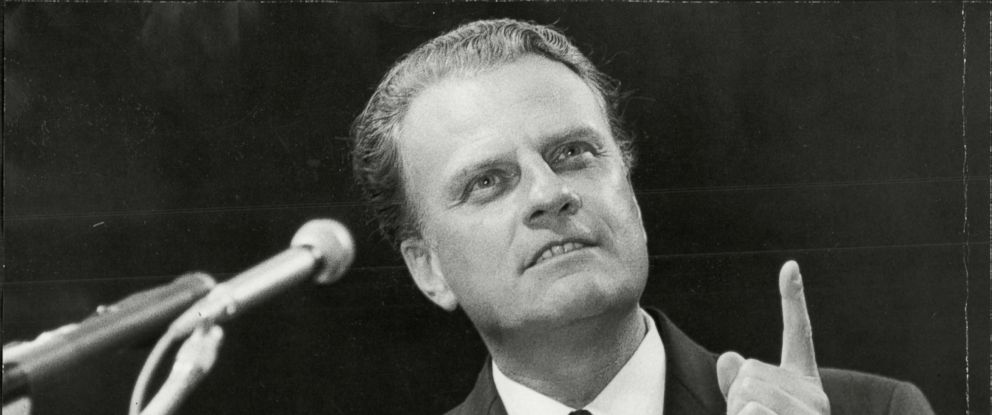

The Rev. Billy Graham, one of the world's most famous Christian evangelists, has died, a family spokesman said Wednesday. He was 99.
Graham died at his North Carolina home Wednesday morning, spokesman Mark DeMoss said.
At a press briefing Wednesday night, DeMoss said Graham -- whose body he said is currently at Morris Funeral Home in Asheville, North Carolina -- was not in the company of any family members when he died. DeMoss said Graham died in his sleep, and that an attendant nurse would have been the only person with him.
DeMoss said Graham's body is slated to move Thursday afternoon to the Billy Graham Training Center in Asheville. A private family prayer service will be held Saturday morning. Beginning Monday, for at least two days, Graham's body will lie in repose at the Graham family home.
Then next Friday, a 90-minute funeral will be held at which his son Franklin Graham will speak, in addition to his other children. The hymns chosen for the funeral are some of Graham's favorite. In fact, he personally approved the details of the service years ago.
After the funeral, Graham's body will be buried at a cross-shaped brick walkway in the northeast side of the Billy Graham Library, next to his wife Ruth, who was buried in 2007. The interment will be private and family-only. Casket was made by inmates at Louisiana State Penitentiary prison in Angola.
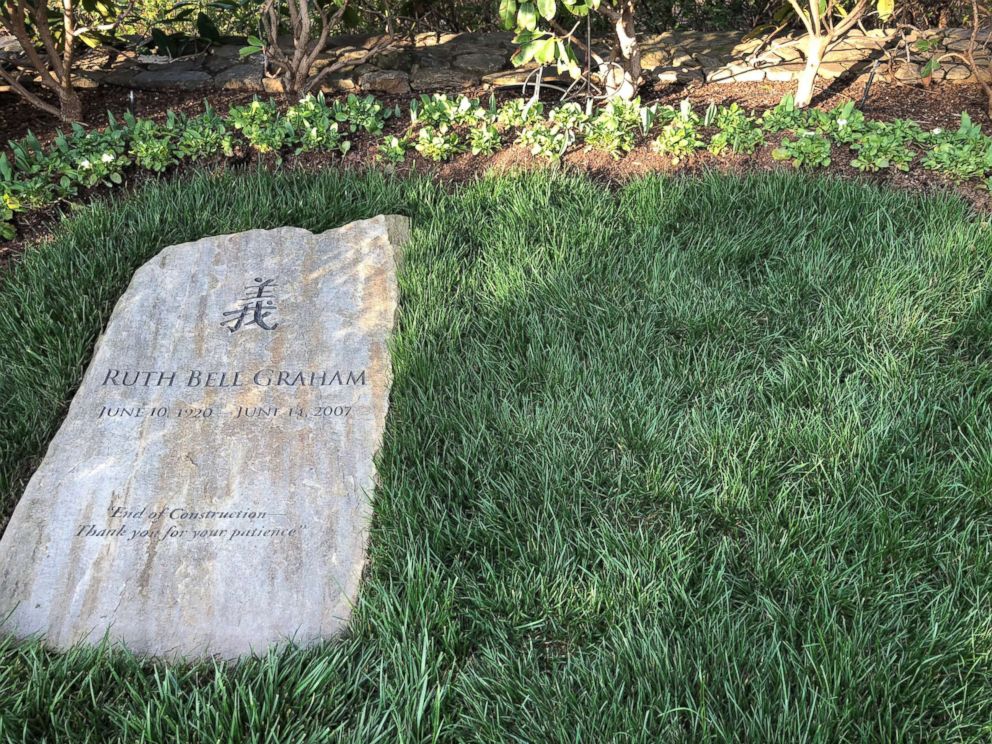 Billy Graham will be buried next to his wife Ruth, at this plot in North Carolina.
Billy Graham will be buried next to his wife Ruth, at this plot in North Carolina.Invitations have been extended to President Donald Trump and Vice President Mike Pence, as well as living ex-presidents, DeMoss said.
Known as "America's pastor," Graham was a key figure in the revival of the U.S. evangelical Christian movement. The preacher began holding revival meetings in the 1940s and went on to become an adviser to several U.S. presidents.
He had been in poor health in recent years, and had turned his international ministry over to son Franklin Graham. Graham did not have cancer, despite reports claiming otherwise, his spokesman said.
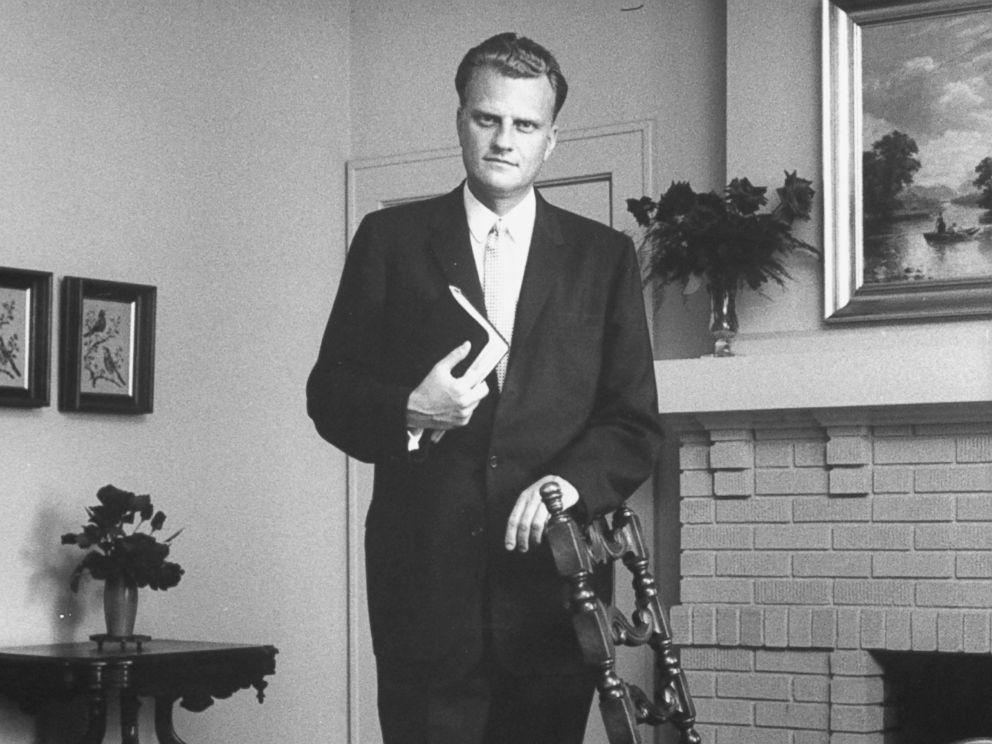 Billy Graham through the years
Billy Graham through the yearsDespite numerous hospitalizations in recent years, Graham's work remained in the public eye late into his life. In 2011, around his 93rd birthday, he released what The Associated Press said was his 30th book, "Nearing Home: Life, Faith, and Finishing Well," on the subject of aging. Also in 2011, audio files documenting six decades of his ministry were put online in a searchable database.
Graham brought evangelical Christianity into the mainstream. As a spiritual adviser to U.S. presidents, he had great access to the White House.
"Each one I've known long before they ever became president, been in their homes many times; always called them by their first names, until they became president," Graham said of several former presidents.
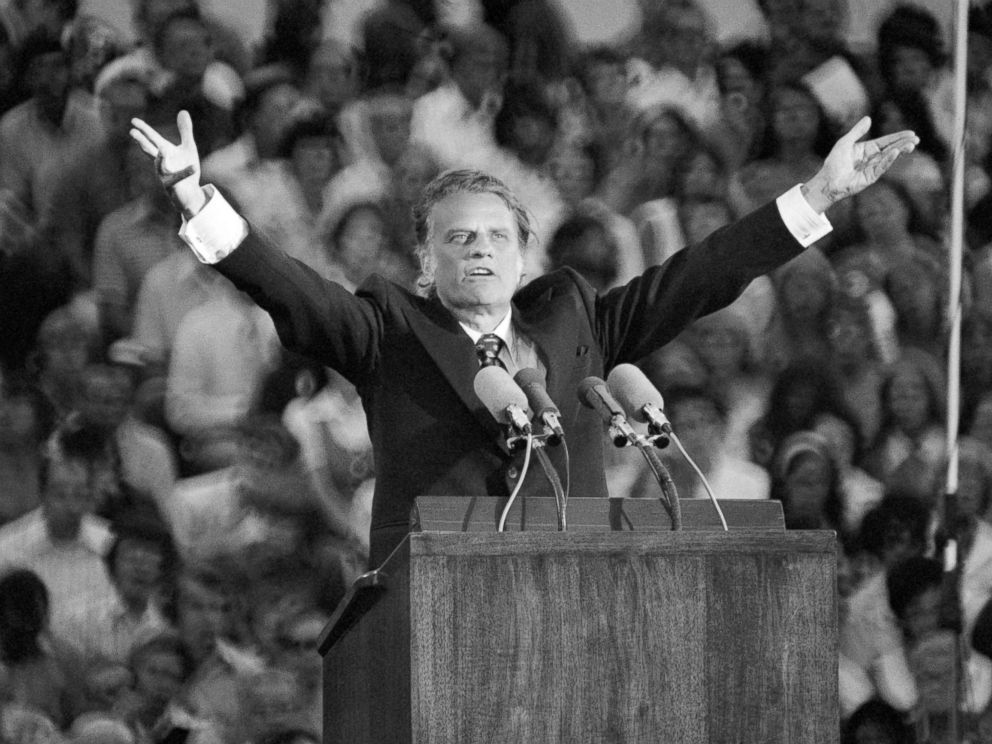 Bettmann Archive/Getty Images, FILEEvangelist Billy Graham preaches to a crowd of 21,000 in St. Paul, Minn., about Judgement Day, July 13, 1973.
Bettmann Archive/Getty Images, FILEEvangelist Billy Graham preaches to a crowd of 21,000 in St. Paul, Minn., about Judgement Day, July 13, 1973.He was especially close to Dwight D. Eisenhower, Lyndon Johnson, Richard Nixon, Ronald Reagan and both Bushes.
Bill Clinton turned to him after his much publicized sex scandal, and George W. Bush credited Graham with helping him to quit drinking alcohol.
When asked how his life would be different if it were not for Billy Graham, George W. Bush said simply, "I wouldn't be president."
Donald and Melania Trump met Graham at the preacher's 95th birthday party in 2013, but they never met after Trump took office as president.
The evangelist brought his "Billy Graham Crusades" around the world, preaching to more than 210 million people in 185 countries and territories. His largest such gathering drew 1 million people in Seoul, South Korea, in the 1970s.
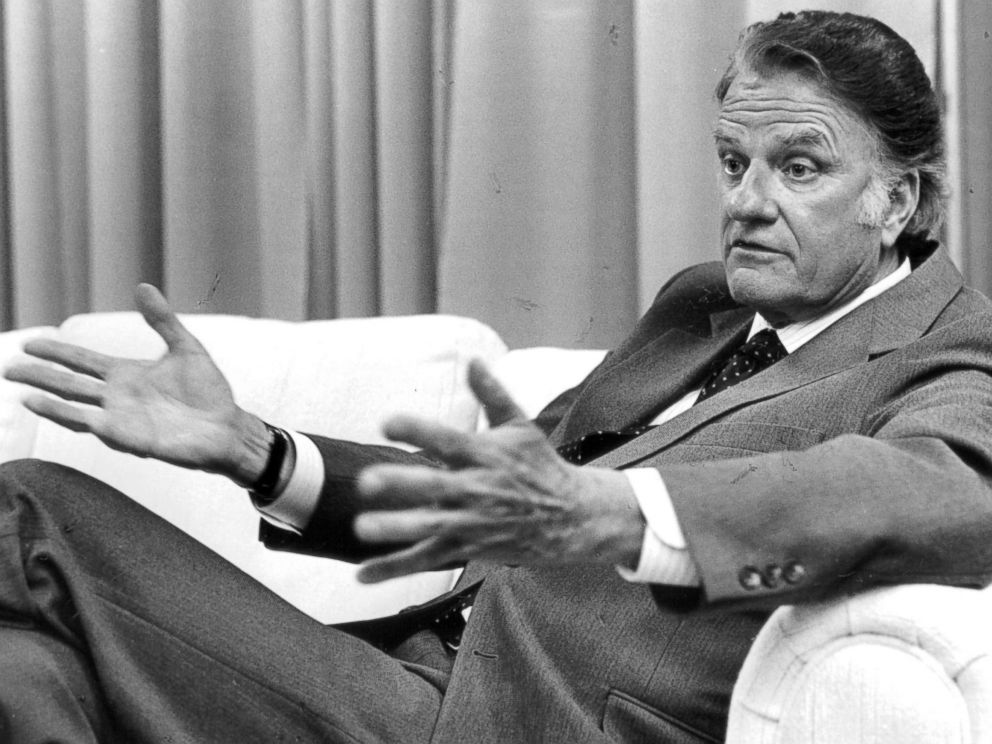 Glen Martin/The Denver Post via Getty Images, FILEBilly Graham is being interviewed in the Mile High Stadium, July 1, 1987, in Denver.
Glen Martin/The Denver Post via Getty Images, FILEBilly Graham is being interviewed in the Mile High Stadium, July 1, 1987, in Denver.As Graham prepared at age 86 for what he called his final U.S. crusade, a three-day event in New York City the weekend of June 25, 2005, he pondered his own mortality.
"Do I fear death?" he asked at a news conference. "No. I look forward to death with great anticipation. I'm looking forward to seeing God face to face, and that could happen any day."
Graham was met with criticism in February 2002, when audiotapes released by the National Archives revealed a 1972 conversation with Nixon at the White House in which Graham said Jewish people had a "stranglehold" on the media.
He later apologized and said his work with Jewish people over the years belied that remark.
Billy Graham had been admitted numerous times in recent years to Mission Hospital in Asheville, North Carolina, for a pulmonary condition. Upon being admitted Nov. 30, 2011, he was seen "alert, smiling and waving at hospital staff," his family said in a statement at the time.
He was diagnosed with Parkinson's disease in 1989. He also suffered from prostate cancerand hydrocephalus, or fluid on the brain, according to The Associated Press. In January 2004, he fell and fractured his left hip, and afterward used a walker to move about.
A born preacher
Graham was born Nov. 7, 1918, in Charlotte, North Carolina, and raised on a dairy farm in nearby Montreat. The eldest of four children in a strict Presbyterian family, he was known as "Billy Frank" in his teenage years.
His life began to change at age 16 when he heard the fiery sermon of a traveling evangelist named Mordecai Ham, who persuaded him to give his life to Christ during a spiritual revival. He attended Bob Jones University in Greenville, South Carolina, but left after one semester, saying the religious school was too strict.
He went on to Florida Bible Institute, now called Trinity College, near Tampa and was ordained a Southern Baptist minister in 1939.
At Wheaton College in Illinois, he majored in anthropology. In 1943, he married fellow Wheaton student Ruth McCue Bell, daughter of a missionary doctor. They remained married until her death in 2007.
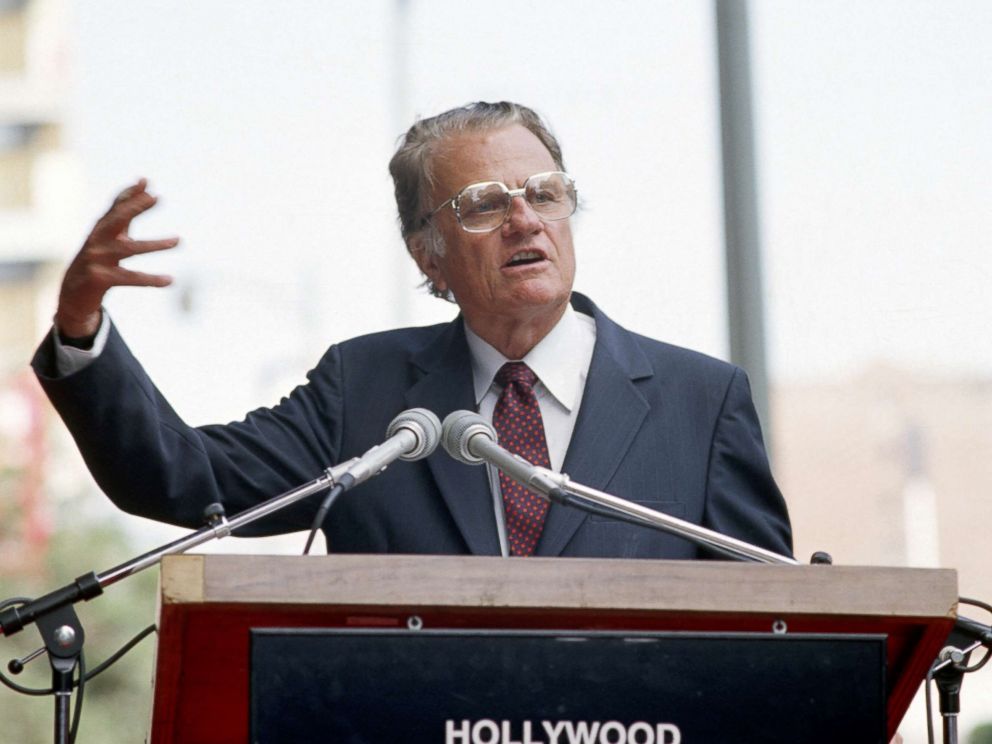 Jim Smeal/WireImage/Getty Images, FILEBilly Graham is honored with a Star on the Hollywood Walk of Fame at 6901 Hollywood Blvd. in Hollywood, Calif., October 15, 1989.
Jim Smeal/WireImage/Getty Images, FILEBilly Graham is honored with a Star on the Hollywood Walk of Fame at 6901 Hollywood Blvd. in Hollywood, Calif., October 15, 1989.From 1947 to 1952, Graham served as president of Northwestern College in Minneapolis. It was during this period that he began holding revival meetings with singer George Beverly Shea and song leader Cliff Barrows.
By 1949, his career was taking off as some 10,000 people were turning out to hear Graham's preaching on a regular basis. A New York City crusade in Madison Square Garden in 1957 ran nightly for 16 weeks.
Graham founded the Billy Graham Evangelistic Association in 1950, running it for 50 years before retiring and handing it over to his son, the Rev. Franklin Graham, in November 2000.
Graham began preaching overseas in 1954 with a visit to Great Britain, where more than 2 million people attended his rallies. He held hundreds of rallies around the world, including South Africa, South Korea, Poland and Romania. In 1990, he toured China, something he would later call the "greatest crusade of my life."
Graham's autobiography, "Just As I Am," was published in 1997.
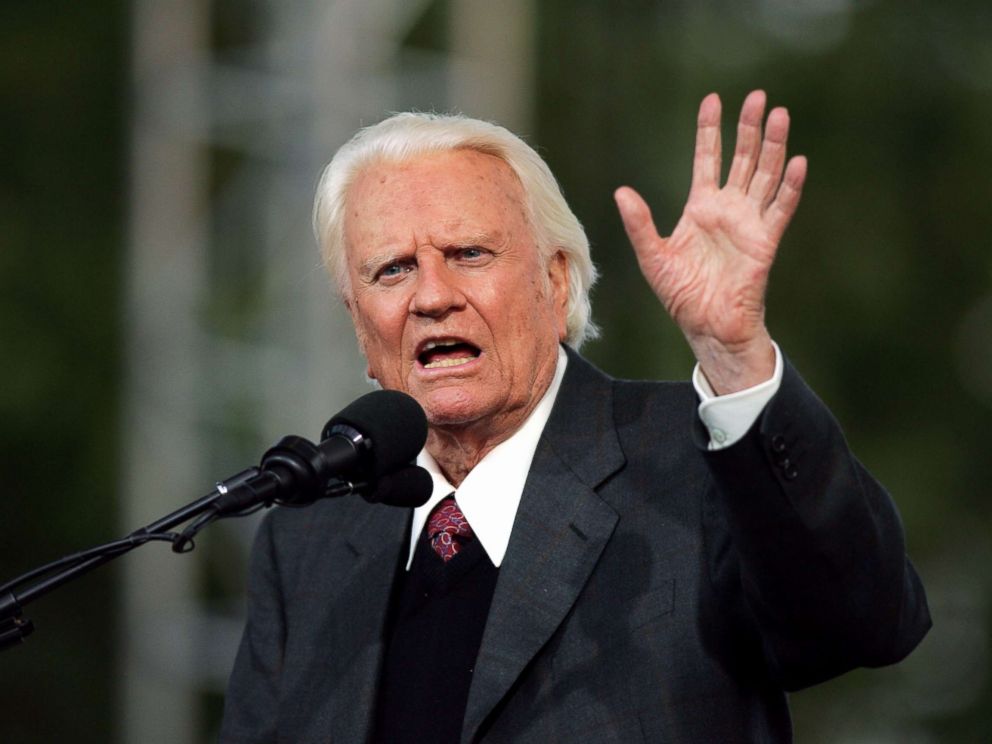 Michael Appleton/NY Daily News Archive via Getty Images, FILEThe Rev. Billy Graham, 86, delivers his sermon to a crowd of about 80,000 on the second day of the Greater New York Billy Graham Crusade at Flushing Meadows-Corona Park in Queens, New York, June 25, 2005.
Michael Appleton/NY Daily News Archive via Getty Images, FILEThe Rev. Billy Graham, 86, delivers his sermon to a crowd of about 80,000 on the second day of the Greater New York Billy Graham Crusade at Flushing Meadows-Corona Park in Queens, New York, June 25, 2005.Family business
After Franklin Graham took over as chief executive officer of the Billy Graham Evangelistic Association, the elder Graham continued to serve as chairman of the board. Franklin Graham also ran his own ministry, the Samaritan's Purse international relief organization.
The other four Graham children also got into the family business, either through their own ministries or evangelical speaking.
Graham is survived by three daughters, two sons as well as numerous grandchildren and great-grandchildren
Source: abcnews



![[Download] MP3: Angel C - Smile](https://blogger.googleusercontent.com/img/b/R29vZ2xl/AVvXsEhYWTxUjmISpYPBsCbvAtcoZoFsmSfnj_8Y_XQqvtyBsgUGBwONxvQzyYkiqbQWIyvAG1XS96LxY6TYYI0ae4XYdWteQ2-n_Ddimfctc_O3zYX1NWex_l9ayMqyhQaPKkTnlXnIJL47hsI1/w100/Angel+C+-+Smile+free+download_www.merchantcolony.com.jpg)
![New Single: "Powerful Healer - Sandy " | Prod: by Ife Keys [@sandramusician]](https://blogger.googleusercontent.com/img/b/R29vZ2xl/AVvXsEi8c-aLI4p4Z_jC-LMVP27AcUYt77OB3O02_kCdm3k9fiHJ4Lfo8Thyphenhyphen9LUBSUBTLTlgYQh7sgQ-SWFzqXdLQ6BOCebq4IoyaFMLb7kXwW0KSCH0_fEOltbi3E9sy7z3QSUORTpFYu7qa-9z/w100/Sandy+-+Powerful+Healer.jpg)

0 Comments